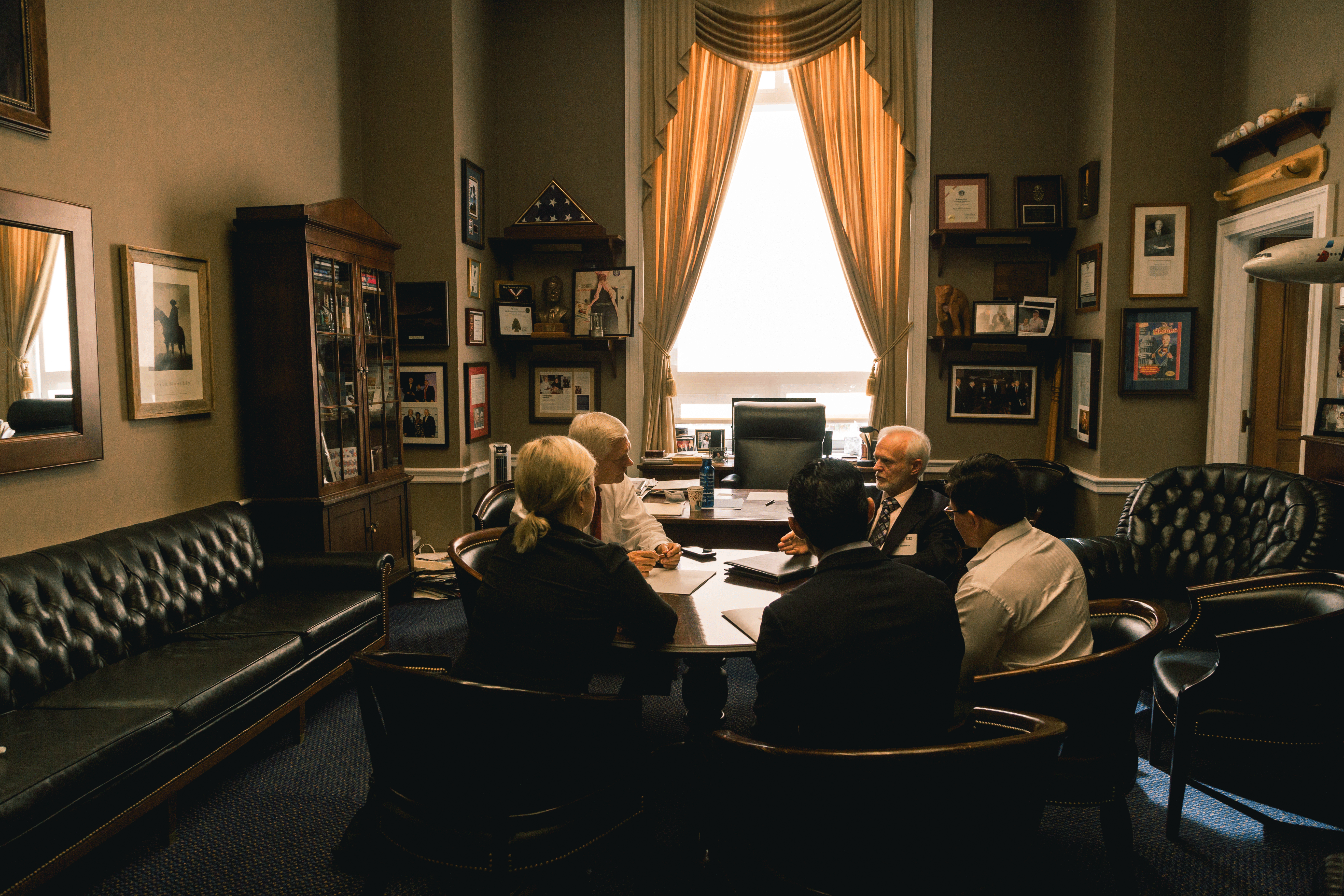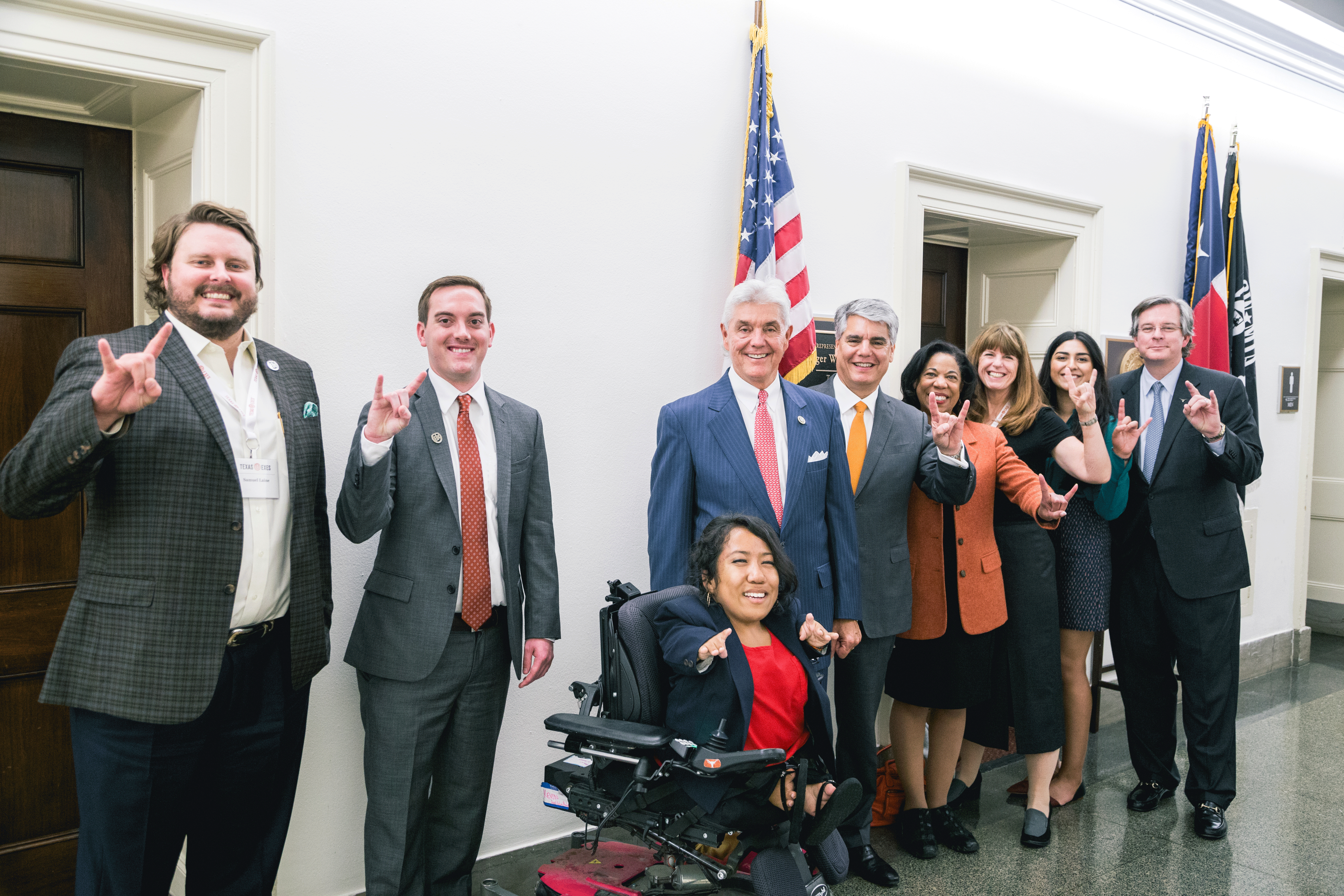UT Alumni Advocate for Higher Ed at Third Annual Longhorns on the Hill

Longhorns on the Hill, now in its third year, kicked off bright and early on Tuesday, Oct. 24, at the Liaison Hotel in Washington, D.C. The 7:30 a.m. start time no doubt came hardest for Longhorn and Redskins quarterback Colt McCoy, BS ’09, who delivered his keynote speech to UT administrators, Texas Exes, and members of Congress about four hours after returning to D.C. from a Monday Night Football game against Philadelphia.
“Last night was a tough loss, but I’ve learned to lose games in the NFL. I didn’t learn that much in college,” he joked to laughter and rousing applause, before delivering a heartfelt speech on the importance of his UT experience. “Football was a defining aspect of my college experience,” McCoy said, “but getting my degree will probably have more impact for me down the road.”
The goal of the all-day event, President Fenves told the crowd, was to let elected officials know two things on behalf of UT Austin: “The issues, needs, and challenges we are currently facing at UT, and what our university is doing to change the world.” With that in mind, and fueled by breakfast tacos, about 30 UT advocates, Fenves, and UT Student Body President Alejandrina Guzman, all clad in burnt orange, hit the Hill for nearly 30 meetings at Texas delegation offices.
"This event builds in energy every year,” said Daniel Becka, Vice President of Constituent Relations for the Texas Exes. “Every Texas Ex who shares their Longhorn story with members of Congress and staff are able to convey a personal example of the positive impact a UT Austin degree returns into their home community.”

Conversations focused on higher education issues like research project funding, the rising cost of tuition, tax reform and charitable contributions, and campus sexual assault. Because of the decrease in federal funding for research in recent years, advocates also stressed its importance by sharing examples of pioneering UT Austin research, which brings in over $724 million to the Texas economy, or the equivalent of nearly 12,000 jobs. In 2013, UT Austin received around 73 percent of its research funding from federal sources—by 2015, only 56 percent of research funding came from federal sources. The use of supercomputer Stampede2 to predict storm surges during Hurricane Harvey, and the MasSpec Pen, a tool that detects cancerous tissue in just 10 seconds, are two examples of UT research funded in part by federal agencies.
Advocates stressed the importance of tools for students to manage their debt and pay back their loans, and the need to adequately fund and expand student financial aid and loan forgiveness programs. Nearly 66 percent of UT undergraduates earn a degree in four years or less—the highest graduation rate in UT’s history, a fact that Texas Exes touted to help advocate for the efficiency and value of a UT Austin degree for the economic growth of Texas.
James Baker, BA ’07, Life Member, works on the Hill as Director of Public Policy for Congressman John Ratcliffe, and says he feels doubly invested in an event like Longhorns On the Hill. "As a policy staffer," he explains, "It is critically important to hear how the university is impacting these industries and how legislation that will be considered can impact these industries. Meeting with your representatives allows you to communicate in a way that a letter or call doesn’t. You will have the attention of the people who make important decisions that will affect the university, and your personal narrative and building a rapport with the member is something that is incredibly effective."

Of course, many reps and advocates also found time to touch on more lighthearted—but still important—topics, such as the best barbecue joints in D.C., Longhorn football, and the lack of quality Tex-Mex in the nation’s capital.
June Deadrick, BA ’95, Life Member, serves as Chair of the Texas Exes Committee on Public Affairs and has now spent two years advocating for UT Austin at Longhorns on the Hill. As someone who works in government affairs (Deadrick is Director of State & Federal Relations for CenterPoint Energy), she says she knows how important it can be to share information on issues directly with elected officials and their staff.
“It’s one thing to send them a letter, it's one thing to attend their town hall,” she said, “But when they know that people have taken time out of their work schedule on their personal time, and their personal money, to come up here and meet with them about these kind of issues, it means that much more to them.”
Here are some of our favorite tweets from the day:





